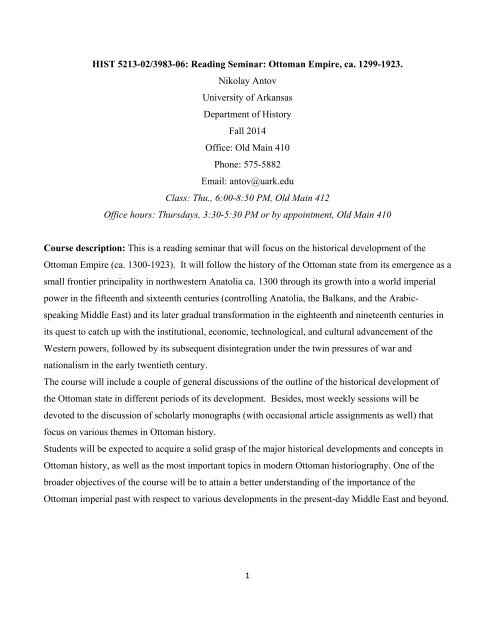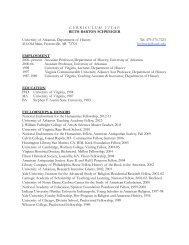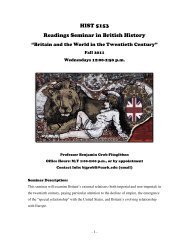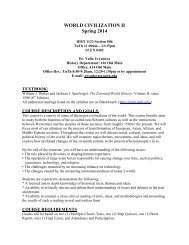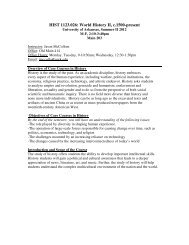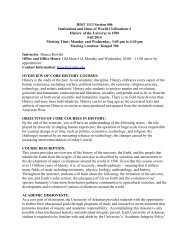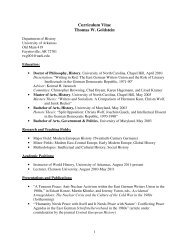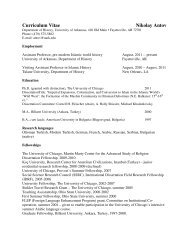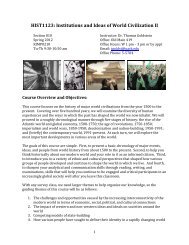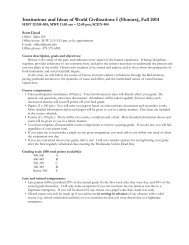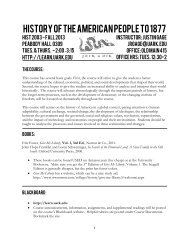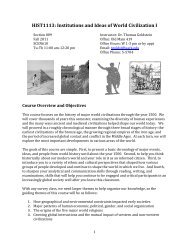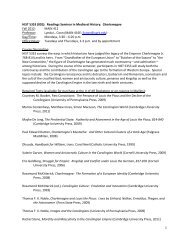HISTORY 5213 â Reading Seminar â The 19th Century Middle East ...
HISTORY 5213 â Reading Seminar â The 19th Century Middle East ...
HISTORY 5213 â Reading Seminar â The 19th Century Middle East ...
Create successful ePaper yourself
Turn your PDF publications into a flip-book with our unique Google optimized e-Paper software.
HIST <strong>5213</strong>-02/3983-06: <strong>Reading</strong> <strong>Seminar</strong>: Ottoman Empire, ca. 1299-1923.<br />
Nikolay Antov<br />
University of Arkansas<br />
Department of History<br />
Fall 2014<br />
Office: Old Main 410<br />
Phone: 575-5882<br />
Email: antov@uark.edu<br />
Class: Thu., 6:00-8:50 PM, Old Main 412<br />
Office hours: Thursdays, 3:30-5:30 PM or by appointment, Old Main 410<br />
Course description: This is a reading seminar that will focus on the historical development of the<br />
Ottoman Empire (ca. 1300-1923). It will follow the history of the Ottoman state from its emergence as a<br />
small frontier principality in northwestern Anatolia ca. 1300 through its growth into a world imperial<br />
power in the fifteenth and sixteenth centuries (controlling Anatolia, the Balkans, and the Arabicspeaking<br />
<strong>Middle</strong> <strong>East</strong>) and its later gradual transformation in the eighteenth and nineteenth centuries in<br />
its quest to catch up with the institutional, economic, technological, and cultural advancement of the<br />
Western powers, followed by its subsequent disintegration under the twin pressures of war and<br />
nationalism in the early twentieth century.<br />
<strong>The</strong> course will include a couple of general discussions of the outline of the historical development of<br />
the Ottoman state in different periods of its development. Besides, most weekly sessions will be<br />
devoted to the discussion of scholarly monographs (with occasional article assignments as well) that<br />
focus on various themes in Ottoman history.<br />
Students will be expected to acquire a solid grasp of the major historical developments and concepts in<br />
Ottoman history, as well as the most important topics in modern Ottoman historiography. One of the<br />
broader objectives of the course will be to attain a better understanding of the importance of the<br />
Ottoman imperial past with respect to various developments in the present-day <strong>Middle</strong> <strong>East</strong> and beyond.<br />
1
Learning Goals:<br />
Students are expected to demonstrate the following:<br />
1. A focused and in depth knowledge of historical facts, themes and ideas.<br />
2. An ability to critically discuss and debate their understanding of issues and debates in the past and<br />
present.<br />
3. An ability to conduct a close critical reading of texts, ideas, and methodologies and presenting the<br />
results of such a reading in oral and written form.<br />
Course requirements:<br />
Attendance and participation: Students are expected to attend class regularly and participate in class<br />
discussions.<br />
As this is a reading seminar, attendance and active participation in class discussion are of crucial<br />
importance. Students will be expected to have carefully read the assigned readings each week even if<br />
they are not turning in a reading response paper in that particular week.<br />
Absences: being absent from class may affect negatively your progress in class as well as your final<br />
grade. Absences from regular lecture/discussion classes may be excused on the basis of proper medical<br />
documentation and/or a note from the student’s college advisor. Absences on exam or paper submission<br />
due days as well as petitions for a term-paper submission deadline extension will be excused/honored<br />
only if the instructor receives a proper note from the student’s college advisor accompanied, when<br />
applicable, by the proper medical documentation.<br />
Discussion leadership: each week one student will be expected to lead class discussion. He/she will be<br />
expected to briefly introduce the readings (10-15 minutes) at the beginning of the respective class<br />
session and then to start discussion by posing 2-3 relevant questions. <strong>The</strong> discussion leader will be<br />
responsible for leading the discussion as it develops and pose further questions in the course of the class<br />
session.<br />
<strong>Reading</strong> response papers: Students will be expected to write weekly reading response papers (800-1200<br />
words in length), which will discuss the structure and the major arguments developed in the assigned<br />
2
eadings for the week. Students are also encouraged to critique the assigned readings to the extent their<br />
knowledge of the subject and the related literature allow.<br />
Graduate students will be expected to turn in 10 reading response papers.<br />
Undergraduate students will be expected to turn in 6 reading response papers.<br />
<strong>Reading</strong> response papers will be due 8 p.m. each Wednesday. Late papers will not be accepted.<br />
Annotated bibliography: an annotated bibliography of at least 20 entries on a topic related to the class.<br />
Bibliographies will be due in class on Dec. 6.<br />
Grade distribution:<br />
Class participation: 20%<br />
Discussion leadership: 20%<br />
Annotated bibliography: 10%<br />
<strong>Reading</strong> response papers: 50%<br />
Required <strong>Reading</strong>s: assigned readings are given under each weekly heading in the schedule of class<br />
meetings. <strong>The</strong> following titles have been ordered through the University Bookstore. Out-of-print books<br />
will be available on reserve in library. Articles/book chapters will be posted on the class website.<br />
Dimitris Kastritsis, <strong>The</strong> Sons of Bayezid: Empire Building and Representation in the Ottoman Civil War<br />
of 1402-1413 (Leiden & Boston: Brill, 2007)<br />
Franz Babinger, Mehmed the Conqueror and His Time (Princeton: Princeton University Press, 1978,<br />
1992)<br />
Giancarlo Casale, <strong>The</strong> Ottoman Age of Exploration (Oxford & New York: Oxford University Press,<br />
2010)<br />
3
Sam White, <strong>The</strong> Climate of Rebellion in the Early Modern Ottoman Empire (New York: Cambridge<br />
University Press, 2011)<br />
Tezcan, Baki, <strong>The</strong> Second Ottoman Empire: Political and Social Transformation in the Early Modern World<br />
(Cambridge and New York: Cambridge University Press, 2010)<br />
Leslie Peirce, <strong>The</strong> Imperial Harem: Women and Sovereignty in the Ottoman Empire (Oxford and New<br />
York: Oxford University Press, 1993)<br />
Selim Deringil, <strong>The</strong> Well-protected Domains: Ideology and the Legitimation of Power in the Ottoman<br />
Empire, 1876-1909 (London & New York: I.B. Tauris, 1998)<br />
Useful Reference Resources:<br />
1) Enclyclopaedia of Islam (Leiden: Brill, 1960-) -- the library has the paper version of this work.<br />
It is the best starting point for a research on anything related to Islam and Muslim culture in<br />
general (DS37.E523 1999 v.1-10).<br />
2) <strong>The</strong> New Cambridge History of Islam (Cambridge: Cambridge University Press, 2010). This is<br />
the best and up-to-date general coverage of the history of the Islamic world in English. For the<br />
purposes of this class vol. 1 is the most important, as well as volume 4; volumes 2 and 3 may<br />
prove essential as well, depending on one’s specific research interests. <strong>The</strong> library has all six<br />
volumes in hard copy as well as in the online version (DS35.6.C3 2010 v. 1-6).<br />
3) Encyclopaedia Iranica (London and Boston: Routledge & Kegan Paul, 1985-) – the library has<br />
all volumes in hard copy. Excellent reference resource on any issue related to the history and<br />
culture of Iran and the Persophone world in general. (DS253.E53 1985 v. 1-15).<br />
4) <strong>The</strong> Cambridge History of Iran (Cambridge: Cambridge University Press, 1968), volumes 4-5<br />
(DS272.C34 v 1-8).<br />
Inclement weather<br />
In the event of inclement weather, students are asked to monitor closely their email and the<br />
Blackboard website for updates about the status of class meetings. In general, if weather forces<br />
the Razorback Transit System to suspend operations, then class will be canceled.<br />
4
Academic integrity<br />
“As a core part of its mission, the University of Arkansas provides students with the opportunity to<br />
further their educational goals through programs of study and research in an environment that promotes<br />
freedom of inquiry and academic responsibility. Accomplishing this mission is only possible when<br />
intellectual honesty and individual integrity prevail. Each University of Arkansas student is required to<br />
be familiar with and abide by the University’s ‘Academic Integrity Policy’ which may be found at<br />
http://provost.uark.edu/245.php. Students with questions about how these policies apply to a particular<br />
course or assignment should immediately contact their instructor.”<br />
Use of electronic devices<br />
Students are allowed to use laptops only for class-related purposes (usually note-taking or delivering<br />
class presentations). <strong>The</strong> use of laptops in class for any other purpose is not allowed. <strong>The</strong> use of other<br />
electronic devices (such as cell phones, iPhones, iPods, etc.) in class is not allowed. Please make sure to<br />
turn off or switch to silent mode all such electronic devices before entering class.<br />
Syllabus<br />
Please note that I reserve the right to make changes to this syllabus, including the schedule of<br />
assignments and the selected readings. I reserve the right to add some additional articles depending on<br />
the way course discussions develop. If additional articles are added, students will be properly notified in<br />
advance.<br />
I recommend that you refer to the syllabus frequently and make careful note of any changes announced<br />
in class.<br />
Further notes<br />
Students with disabilities should contact <strong>The</strong> Center of Educations Access to find out about their rights<br />
and their obligations. <strong>The</strong> instructor will make all accommodations required by the office to facilitate a<br />
student’s experience in the class.<br />
5
Schedule of class meetings and reading assignments<br />
Week One<br />
August 28: Introduction, discussion of course objectives<br />
• Donald Quataert, a timeline of Ottoman history, maps and “Why Study Ottoman history,” in <strong>The</strong><br />
Ottoman Empire 1700-1922, second edition (Cambridge and New York: Cambridge University Press,<br />
2005) xvii-xxii, 1-12.<br />
• Suraiya Faroqhi, “Introduction,” in Approaching Ottoman History. An Introduction to the Sources<br />
(Cambridge, UK: Cambridge University Press, 1999), 1-19.<br />
• Jane Hathaway, “Problems of Periodization in Ottoman History: the Fifteenth through the Eighteenth<br />
Centuries,” <strong>The</strong> Turkish Studies Association Bulletin, vol. 20, no. 2 (Fall 1996): 25-31 (recommended).<br />
Week Two<br />
September 4: Overview of Ottoman history, the ‘classical age’<br />
• Halil Inalcik, <strong>The</strong> Ottoman Empire: the Classical Age, 1300-1600, (London: Phoenix, 2000; original<br />
edition -- London: Weidenfeld &Nicolson, 1973).<br />
Week Three<br />
September 11: the question of Ottoman origins<br />
• Paul Wittek, <strong>The</strong> Rise of the Ottoman Empire (London: <strong>The</strong> Royal Asiatic Society, 1938) (pdf)<br />
• M. Fuad Köprülü, <strong>The</strong> Origins of the Ottoman Empire, tr. and ed. Gary Leiser (Albany: SUNY Press,<br />
1992, originally published in 1935), 111-117 (required); 71-111 (optional) (pdf)<br />
• Rudi Paul Lindner, Nomads and Ottomans in Medieval Anatolia (Bloomington: Research Institute for<br />
Inner Asian Studies, 1983), 1-50 (pdf)<br />
• Halil Inalcik, “<strong>The</strong> Question of the Emergence of the Ottoman State,” reprinted in Studies in Ottoman<br />
Social and Economic History (London: Variorum Reprints, 1985), 71-79. (pdf)<br />
• Cemal Kafadar, Between Two Worlds: the Construction of the Ottoman State (Berkeley and Los<br />
Angeles: University of California Press, 1996), 29-59; 118-150 (pdf)<br />
• Heath Lowry, <strong>The</strong> Nature of the Early Ottoman State (Albany: SUNY Press, 2003), 55-94; (pdf)<br />
Week Four<br />
September 18: <strong>The</strong> Civıl War (to be rescheduled)<br />
• Dimitris Kastritsis, <strong>The</strong> Sons of Bayezid: Empire Building and Representation in the Ottoman Civil<br />
War of 1402-1413 (Leiden & Boston: Brill, 2007)<br />
• Halil Inalcik, “Ottoman Methods of Conquest”, Studia Islamica 2 (1954), 103-129 (pdf)<br />
6
Week Five<br />
September 25: Mehmed II<br />
• Franz Babinger, Mehmed the Conqueror and His Time (Princeton: Princeton University Press, 1978,<br />
1992)<br />
• Halil Inalcik, “Mehmed the Conqueror and His Time,” Speculum 35/3 (1960): 408-427<br />
Week Six<br />
October 2: <strong>The</strong> Age of Süleyman and Beyond<br />
• Cornell Fleischer, Bureaucrat and Intellectual in the Ottoman Empire: <strong>The</strong> Historian Mustafa Ali<br />
(1541-1600) (Princeton: Princeton University Press, 1986)<br />
Week Seven<br />
October 9: <strong>The</strong> Ottomans and the Outside World in the ‘classical age’<br />
• Giancarlo Casale, <strong>The</strong> Ottoman Age of Exploration (Oxford & New York: Oxford University Press,<br />
2010)<br />
• Svat Soucek, “About the Ottoman Age of Exploration,” Archivum Ottomanicum 27 (2010): 313-342<br />
Week Eight<br />
October 16: Daily Life in the Ottoman Provinces in the Early Modern Period<br />
• Suraya Faroqhi, Towns and Townsmen of Ottoman Anatolia: Trade, Crafts and Food Production in an<br />
Urban Setting, 1520-1650 (Cambridge and New York: 1984)<br />
Week Nine<br />
October 23: <strong>The</strong> Time of Troubles<br />
• Sam White, <strong>The</strong> Climate of Rebellion in the Early Modern Ottoman Empire (New York: Cambridge<br />
University Press, 2011)<br />
Week Ten<br />
October 30: Time of Stagnation, or ‘the Second Ottoman Empire’; the question of ‘decline’<br />
7
• Baki Tezcan, <strong>The</strong> Second Ottoman Empire: Political and Social Transformation in the Early Modern<br />
World (Cambridge and New York: Cambridge University Press, 2010)<br />
• Halil Inalcik, “Military and Fiscal Transformation in the Ottoman Empire, 1600-1700”, Archivum<br />
Ottomanicum 6 (1980), 283-337 (pdf)<br />
• Bernard Lewis, “Ottoman Observers of Ottoman Decline,” Islamic Studies 1 (1962), 71-87 (pdf)<br />
• Linda Darling, “<strong>The</strong> Myth of Decline,” introductory chapter in her Revenue Raising and Legitimacy:<br />
Tax Collection and Finance Administration in the Ottoman Empire, 1560-1660 (Leiden, New York, and<br />
Köln: Brill, 1996), 1-21 (pdf)<br />
Week Eleven<br />
November 6: Women and Sovereignty in the Early Modern Ottoman Empire<br />
• Leslie Peirce, <strong>The</strong> Imperial Harem: Women and Sovereignty in the Ottoman Empire (Oxford and New<br />
York: Oxford University Press, 1993)<br />
Week Twelve<br />
November 13: An Overview of the Late Period<br />
• M. Şükrü Hanioğlu, A Brief History of the Late Ottoman Empire (Princeton: Princeton University<br />
Press, 2008)<br />
Week Thirteen<br />
November 20: Young Ottomans<br />
• Şerif Mardin, <strong>The</strong> Genesis of Young Ottoman Thought: A Study in the Modernization of Turkish<br />
Political Ideas (Princeton: Princeton University Press, 1962)<br />
Week Fourteen<br />
November 27: Thanksgiving Holiday – NO CLASS<br />
Week Fifteen<br />
December 4: the Age of Abdülhamid II<br />
• Selim Deringil, <strong>The</strong> Well-protected Domains: Ideology and the Legitimation of Power in the Ottoman<br />
Empire, 1876-1909 (London & New York: I.B. Tauris, 1998)<br />
8
Week Sixteen<br />
December 11: <strong>The</strong> Young Turks<br />
• Feroz Ahmad, <strong>The</strong> Young Turks: <strong>The</strong> Committee of Union and Progress in Turkish Politics, 1908-1914<br />
(Oxford: <strong>The</strong> Clarendon Press, 1969)<br />
• Erik J. Zürcher, “<strong>The</strong> Young Turks: Children of the Borderlands”, International Journal of Turkish<br />
Studies 9:1-2 (Summer 2003), 275-86.<br />
9


